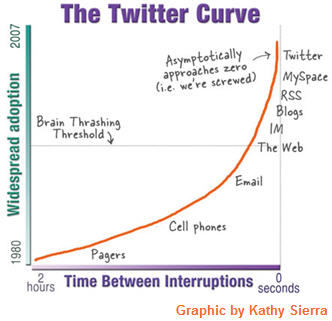Twitter is not just another social network, and it’s not for everyone. It’s userbase is mostly niche, the signal to noise ratio is low, and it takes a long time for some of its most useful features to prove themselves. Add to that that it can be a terrible timesuck, and one has to question its utility. But there is a purpose, it just depends who you are.
The motivation for this post was Geoff Livingston’s discussion of how the number of Twitter users “pales in comparison to major social networks.” That’s a reason why it’s hard to find your friends there, but it’s only one of the differentiators between Twitter and other social networks…
1. It can be hard to feel a part of Twitter
I’ve been on Twitter now for 3 months, though I would’ve liked to have been on it longer (as I’d been reading about it so much since SXSWi 2007). The problem was that I didn’t have friends on the site. Since my involvement in DC social media (geeks, designers, PR people, etc) I’ve developed relationships with many people on Twitter, but only a couple of my other friends are on Twitter. In my experience and from those who I’ve read, Twitter users are primarily in the tech and media communities.
2. Quality content is few and far between
Twitter serves a number of purposes: keeping in touch, discovering or sharing new information/links, offering or getting answers to questions, and passing the time. For those who use Twitter to keep up with a small group of friends it can be rewarding–it’s great to know what’s going on in (a manageable number of) people’s lives, but after following more than 75 people that quickly becomes a chore. The same can be said for discovering and sharing information–Twitter can be a good platform for learning or getting the word out, but there’s quickly too much information coming in (especially when combined with RSS and social news sites). More on getting the word out in point #3.
3. Some of the most useful features are not available to everyone
When I first joined Twitter, a friend suggested I post a question to my eleven “followers,” and he posted the same question. No one responded. I now have 75 followers (which by Twitter standards isn’t much) and I rarely get much feedback to the questions I post. If I were a Twitter superstar with hundreds or thousands of connections then things would no doubt be different…but I don’t think that most people (especially non media/bloggers/geeks) will find a ton of utility from Twitter polling. Similarly, those without many followers aren’t going to get heavy attention to their site when they post links.
As an example, Jennifer Berk was the only one to respond to my Twitter poll about whether Twitter was for productivity or for fun: “Neither: Twitter tells me news in real time so I can use it immediately, i.e. an Apple announcement, blog post, or caucus result”
I feel a carefully culled collection of RSS feeds and news aggegators will do a better job of meeting my information-gathering needs. But she brings up the important point that if you want to primarily listen then Twitter can be very valuable.
4. The Timesuck
Kathy Sierra nailed it when she explained that “Twitter is the best/worst cause of continuous partial attention.” In other words, it serves to prevent us from extended spans of productivity. It’s anathema to getting things done. Kathy’s graphic illustrates this well:

5. The Value Proposition
There are valuable uses for Twitter, and people for whom Twitter is especially effective. As Jennifer mentioned, anyone can use Twitter to listen–by following people much like one would subscribe to an RSS feed (although, it’s worth noting that one can subscribe to anyone’s individual Twitter RSS feed, as well). Also, if you have a small group of friends on Twitter, it’s a very easy way to keep in touch–especially with all the mobile phone (SMS, mobile site, third party apps) integration.
But if you want to build a reputation and spread a message it’s a time-consuming process. One needs to either be part of the tech/media community or be willing to reach out and find new relationships. If you have a product or blog, Twitter can be a good place to participate, but to truly reap the rewards it may take a long time. It’s worth jumping in and experimenting, but for many people it may not be worth the timesuck.
Since I’m going to (someday) launch AwayFind, since I’ll be heading to SXSWi, and since I’m very active in the DC social media space, it makes sense for me. But for those excited about the “next cool social network” they might want to think hard before getting involved.


You should really subscribe to Technotheory via ![]() email or rss.
email or rss.



 by Jared Goralnick
by Jared Goralnick










Yes, Twitter does take the time away. It’s a compelling little layer, no?
I found out about you because of Twitter. I’ve grabbed the feed for this blog already and thrown it into Google Reader. I eagerly await your possible post (judging by your Twitter feed) on Plaxo Pulse. I’ve looked at that service but have not yet dived in.
I only started really using Twitter a few weeks back. It serves as a nice channel for quick updates, mostly links regarding Undependent content creators, the self-sustaining Internet-based artists that we track. Twitter is great for alerting folks to cool new releases / merch / etc. + neat news.
I also continue to use Del.icio.us, our blog, a YouTube account, and a Netvibes Universe as different kinds of channels serving this same aim. Twitter fits right into this approach quite well.
It’s also uniquely social. If it lacks depth, it offers massive breadth and speed. If email has a voice different than phone calls or in-person hang-outs, Twitter also has its own voice, and I kinda dig it. Often, I laugh at some of the posts and direct messages. It can be really entertaining. It’s quite engaging in that way.
In addition, I am only beginning to pick up on eventtrack and all the #aa08-type stuff. Amazing.
Just this morning, I started a FriendFeed (friendfeed.com/undependent) to aggregate our various “channels” for undependent. So far, it helps me aggregate the above feeds into one. It will be interesting to see if it becomes its own little social layer and/or if I use it to digest aggregate feeds from others. If so, the time taking might spike.
Regarding GTD-type principles with respect to Twitter, I’ve already found that I have to unplug distinctly from all this stuff to really focus and have a nice mental environment for getting things done. I’ve been using my iPhone timer to, e.g., block out an hour or even 20 minutes to drill without distraction on tasks / projects. I’ll also chunk web-dive time, e.g. giving myself 45 minutes to cruise Twitter and Google Reader to read, share, tag stuff. Then I can get back to “work.”
So far, it’s working well.
Thanks for your article and blog. It’s cool finding GTD-related content that touches all these new webservices.
Btw, we’re in Austin. I’ll be at SXSWi. If you wanna meet up, that’d work.
Best.